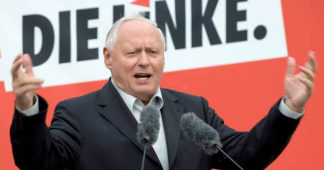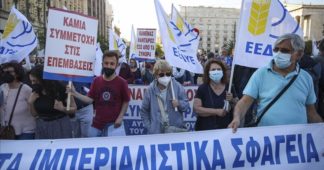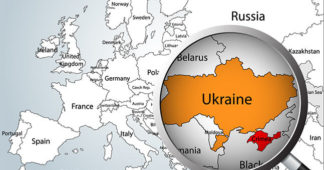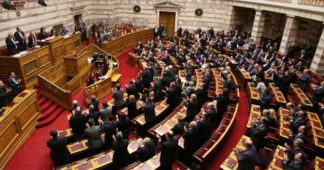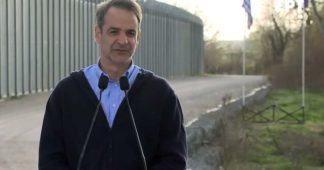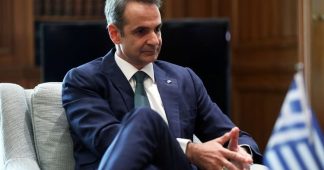By Dimitris Belantis,
Dr. in Constitutional Law, former Member of the Central Committee of SYRIZA
Looking back to the four years’ period since the last national elections of July 2019, we cannot escape the fact that the Greek Left suffered some grave difficulties and failures. This was not exceptional inside the international political landscape: as a matter of fact, the Left in all its European and international versions/variations (socialist, communist, autonomous, antiimperialist, Left of the Woke movements etc) has gone in the 2010s and the first years of this decade through a structural crisis of strategy or even an existential crisis.
Nevertheless, the traumatic experiences of the “existing” Greek Left do also possess a specific national quality. By that, we mean the disastrous political defeat of 2015. The majority of the Left, under the flag of SYRIZA, governed the country between 2015 and 2019. The consequences are not to be easily forgotten: Alexis Tsipras as prime minister massively turned upside down the result of the July 2015 Referendum against the EU backed extreme austerity policies. His government totally surrendered to the EU leadership, introduced, adopted and implemented the Third Loan Memorandum of Understanding (intense expansion of austerity policies and privatizations etc), signed the so called Agreement of Prespes, contributing to NATO’s expansion in the Balkans, and intensified the military and political dependence of Greece on NATO and the USA. It also negotiated the installation of more NATO and USA military bases in Greece. The broken promises of SYRIZA have led to social and political apathy after the extreme neoliberal government of Kyriakos Mitsotakis ( party of “Nea Dimokratia”) came to power in 2019.Resistance exists but the social expectations remain low. What Colin Crouch has described in his famous book[1] as a “post-democratic” political attitude turned to be the dominant mentality in Greece: where lies the real difference between the (major) Left and the Center-Right bloc? Does it practically exist?
And now what? The major formations of the broader Greek Left, SYRIZA, Mera25, KKE- Communist Party of Greece and Antarsya ( extra parliamentary if not exaggerate it? Left) attempt to gain ground in front of the upcoming elections of 21 of May. The formations to the left of SYRIZA have tried to resist the neoliberal “turn” of SYRIZA since 2015. It is useful to remember that SYRIZA had an internal split in 2015 when its main former Left Fraction or Opposition (“Left Platform-Left Stream”) broke with SYRIZA and founded the party of Popular Unity (LAE) with ex minister Panagiotis Lafazanis at its head. LAE could not, by a small margin, enter the Parliament at the second elections of September 2015 -after the surrender of SYRIZA. Opposition to SYRIZA from the parties and formations to the left of it, parliamentary or not, had a positive moral imprint but couldn’t change the material and moral relation of forces. So, when international and national crises broke out ( crisis of the Covid 2019 political management, war in Ukraine, the recent deadly train “accident” at Tempi (28-2-2023), an event with deep roots in the privatization of the railway company and the criminal negligence of both neoliberal state and foreign private company), the new developments were met by a “frozen”, unprepared -and partly unwilling to intervene – Greek Left.
The object of this article is a political critique to the positions of the party Mera25 and its electoral coalition. Mera25 was founded in 2018 by Yanis Varoufakis (professor of Economics, writer and former Finance Minister of SYRIZA from January to July of 2015) as the Greek part of the European party or initiative of Diem25[2] (with Varoufakis as leader as well) against the ruling neoliberal policies in Europe.
At the moment, Mera25 has formed an electoral coalition with LAE (without the participation of Lafazanis and his close supporters) under the name of Mera25- Coalition for the Rupture ( M-CR from now on). Its declarations emphasize the necessary unity of left organizations and citizens and present itself as the first crystallization of a broader Front of the Left so that the Left actively returns to the core of political developments. Only SYRIZA has been excluded from the possible contributors to such a Left Coalition, according to the M-CR.
Should we take these declarations of M-CR for real ? First of all, a “unity and effectiveness of the Left” promise cannot be easily rejected as useless or irrelevant in these hard days. Why not? It is preferable to cooperate than to fight each other, inside the Left, in unending “civil wars”. On the other hand, declarations have to be tested against reality and our own living experience. As Lenin once wrote, it is not sufficient to evaluate political leaders by their sayings only. Methodologically, we have to start our research from the official political programme of this coalition, formulated and published under the title “Everything can happen the other way”[3]. Searching further : official positions and declarations by Yanis Varoufakis in the mass media, Greek or foreign, and his own book on the negotiation of SYRIZA with the troika and the EU in 2015 and its preparations with himself and Tsipras in the major roles[4], are to be taken seriously into account as Varoufakis himself has played a significant role in the crisis of 2015. His own written memories testify it strongly, if not exaggerate it?
- The current programme of M-CR and the role of the EU-Eurozone in it
It is the American novelist Ken Grimwood in his well written novel “Replay”[5] who sets his fictional hero into a repetitional death at the same age and a repetitional rebirth after it. The obvious existential question : would the hero achieve a different or even a better life with every new chance he was offered? Or would the spell never be broken and the following result be the same every time? Is there a possible exit from this vicious cycle? The analogy with the programme and activity of M-CR : is this political coalition equipped and willing to avoid a second disaster after the crisis of the summer of 2015? Or is it just one of the “murderers” or “accomplices” who return to the primal scene of crime?
The class character and the cruelty of the policies of “Nea Dimokratia” find a suitable and correct description in the programme of M-CR. As well as the political complicity of SYRIZA and PASOK as governing parties in the implementation of neoliberalism in Greece during the last twenty five years. Basic political measures, proposed by the M-CR alliance, happen to be essentially correct: retaking of electricity company and networks under public property and control, socialization of the health system and education, nationalization of privatized public companies etc. They are not proposed for the first time though. Some of these measures were part of the initial programme of SYRIZA in the period 2010-2015, although at the founding Congress of SYRIZA ( July of 2013) a part of them was removed or formulated in a more abstract manner so that the “bourgeois” were not terrified.
As far as we have experienced in Greece, it is not enough to raise these demands or programmatic goals . The “government of the Left” must be prepared to choose : is it possible to implement these measures inside the Eurozone against the “hardened” EU institutions? Are they compatible with the Fiscal Pact of the EU (+ SixPack etc) and the Lisbon Constitutional Treaty of the EU? Before the disaster of the summer of 2015, it was not a coincidence that the moderate majority of SYRIZA, where Varoufakis also belonged- although he preferred not to participate in the party public proceedings- maintained that measures against the Memoranda of Understanding were compatible with the euro. The phrase “We will prefer the abolition of austerity than the euro” gradually vanished. So, the Memoranda would be abolished with safety inside the eurozone as the Europeans and the IMF would bend under the Greek democratic -popular pressure at the time of the forthcoming SYRIZA government. The Left Platform ( later LAE) thought about exactly the opposite(preparing for Grexit) and proposed it, remaining a strong minority of 30-40 % of the party. Part of the Left Platform-Left Stream and later of LAE cadres are, nevertheless, cooperating now with the party of Varoufakis, trying to forget the conflict of 2010-2015. Or to interpret Varoufakis as having “made up his mind” to a more radical direction.
In his own book “Adults in the Room”, Varoufakis describes a systematic series of personal meetings and cooperation with Alexis Tsipras, the leader of SYRIZA, and his closest councillor Nikos Pappas[6], in the years from 2011 to 2015 (for some period, once a week). 2013 seems to be a “high point” of this cooperation, concerning also the journey of Tsipras to an economic conference in Texas in the last months of 2013, where Varoufakis, leading economists and finance personalities, also participated. As he sincerely presents his effort, his main perspective was not only to support and counsel Tsipras against the Memoranda and neoliberalism in the EU, but, all the same, to emphatically remove him and his party from the anti-euro stance, that was almost dominant in the SYRIZA of 2011 as a result of the EU financial oppression on the Greek people[7]. Varoufakis describes three possible alternative outcomes for the Greek crisis in the years 2010-2015 : a) an abolition of the Memoranda regulations and legislation and a reduction of the public debt inside the eurozone- optimum outcome b) an exit from the eurozone- middle outcome and c) an extension of the policies of Memoranda inside the eurozone- worst outcome.
To understand better the then position of Varoufakis concerning the eurozone we have to quote some of his exact formulations in the book[8]:
“ … I explained its basic logic (of the book “Modest Proposal” by himself), and then the conversation turned to a general assessment of the political economy of Bailoutistan and the strategies available to progressives intent on offering the country an escape from its prison of debt.
It soon became clear that, for political reasons, Alexis was vacillating over a basic issue: whether Greece should retain the euro. Even in 2011 SYRIZA was torn by internal disagreements over whether the party should or shouldn’t make Grexit ( departure from the eurozone, though not necessarily from the EU) its official policy. As we talked, Alexis’s attitude to the question struck me as cavalier and immature. His thought was more on keeping control of the feuding wings of his party than on clarifying in his own mind what the right policy was. Judging by the meaningful looks coming from Pappas, it was clear that he thought so too and was hoping I would help shift his leader away from casual experimentation with the idea of Grexit. In the hour or so that followed I did my best to impress upon Alexis that turning Grexit into an objective would as large a mistake as filing to prepare for it. I also criticized SYRIZA for making silly promises as that, if elected the bailout agreement with the EU and the IMF would be unilaterally torn up .
….. I told him there was no way Berlin, Brussels, Frankfurt or the IMF would accept a take-it-or-leave-it offer from him; they would simply leave it. So to issue such an ultimatum would be to ensure the third outcome-expulsion from the eurozone-and to remove even the possibility of the first. To leave the door open to the best possible outcome, he needed to force negotiation. On the one hand this meant rejecting Grexit as a threat (let alone an objective) while on the other signaling to the world that his worst fear was not enforced Grexit but the continuation of the current situation..”. Then, he goes on presenting to Tsipras how worse would Grexit look than the Argentina financial crisis of 2001.
First of all, he made clear to Tsipras as early as 2011 that Grexit should not be used during the negotiation as a “possible threat”. It would not seem to be a suitable weapon of the Greek progressive government. Not only as an aim but also as a means of threat to the troika and the EU leadership. This was also the line Varoufakis himself followed as a SYRIZA Finance Minister in the first half of 2015. In the same book, he confirms that he always rejected publicly and in personal discussions during the Euro Groups the idea that the SYRIZA government might decide to leave the eurozone.
After his own narrative, the main issue in the continual meetings with Tsipras was his own effort to shift Tsipras from the concept of Grexit which he considered to be at least “dangerous”( and the middle outcome, not the worst, at the same time). He adds that Greece should not have adopted the euro from the beginning but the expulsion from the eurozone would cause very negative effects. Years later, while he was in office (2/3/2015), he emphasized his strong disapproval of Grexit in an interview to the journalist Nikos Hadjinikolaou : ” A return to drachma would mean return to the Stone Age for Greece, and this is not an exaggeration”[9].
During his serving as a Finance Minister, he did not introduce or support preparations for a possible Grexit outcome in case the negotiation went badly or even press the Prime Minister to prepare a Plan B. On the contrary, he signed the Agreement of the 20th of February 2015, extending the Loan Agreement for six months and accepting verbally that a large part of the Memoranda regulations were correct and appropriate for Greece. Those of us who belonged to the “Left Platform” and participated in the CC of the party remember very well that Varoufakis as well as Tsipras was then the architect for a compromise with the EU, not a favourable one for the working people of Greece. He also gave the order to secure large amounts of money, included in the state and municipalities’ deposits as a fiscal guarantee towards the debtors (spring of 2015).
In his book, he also admits that at the process of forming the first government of SYRIZA in January 2015, he expressed his deep concern for appointing Panagiotis Lafazanis, the leader of the “Left Platform”, Minister of an important financial ministry ( Energy and Productive Reorganization). In a passage of his book, that reveals a passion against the Grexit position, he explains that this appointment would give the wrong message. It would mean that the government had not rejected the Grexit option totally[10].
As he refers in his book :
“ To preserve SYRIZA’ s equilibrium, (Spiros Sagias) explained , Alexis had appointed Panayiotis Lafazanis to the ministry instead. This was terrible. Like Dragasakis, Lafazanis had been an activist of the Communist Party of Greece (KKE) for many years, but while Dragasakis had since shifted to the Right, Lafazanis remained wedded to a Soviet mindset and led the Left Platform which controlled one third of SYRIZA’s Central Committee. Crucially, Lafazanis and his supporters believed that Grexit should be party policy. Over and over again he had stated his view that if we did not threaten to leave the eurozone we would never achieve a decent deal. With Lafazanis in one of the key ministries and with Euclid ( Tsakalotos)-who agreed with our covenant- outside the cabinet, my negotiation strategy was in jeopardy… ”.
So, it seems that Varoufakis in 2017 considered it to be a virtue having passed through KKE and then shifting to the Right, as it was the case with Yannis Dragasakis, and a disadvantage to remain Communist inside a broader Left party like SYRIZA.
The passage above is also characteristic for Varoufakis’ political mentality. He always behaved as a “councillor” to the leader, remaining totally external to the party collective functions and fora. He very rarely appeared at the Central Committee sessions. Repeatedly, he refers to these functions as obsolete if not possibly dangerous. Would it be an exaggeration to define this attitude as one of “liberal oligarchy”? And if this happened in the SYRIZA era, what guarantees do we have that his mindset has radically changed in the M-CR era? The good will of his allies? Part of which contains his former “left” criticizers?
Concerning the Agreement of the 20th of February, Varoufakis demonstrated in the February of 2015, as it is well known, a new SYRIZA approach to the Memoranda and their catastrophic legal regulations[11]-the so called “ 70% gesture”:
“ The official document describing Greece’s programme, known as the Memorandum of Understanding (MoU), was a list of reforms (austerity targets, the institutional elimination of social benefits, privatization targets, administrative and judicial changes and so on) that the previous government had agreed to as the conditions ( conditionalities in troika speak) for receiving the second bailout loan. There was no way we would implement these conditions in full since doing so would involve accepting massive pain for absolutely no gain, especially as more than 90 % of the bailout loan had been dispursed before we were even elected. However, careful study of the MoU list in 2012 had made clear to me that many of its measures could be implemented without too much social damage. Accepting these elements, which comprised about 70 per cent of the MoU, in return for our demands, while rejecting the genuinely toxic measures of the remaining 30 per cent, was a strategic move..”.
So the fictional negotiation would lead to the abolition of the major “toxic” part of the MoU measures and confirm the lesser “non toxic” part. As far as, after the 2015 defeat, the main skeleton of the MoU regulations remains legally valid, not depending on further loaning anymore, it would be interesting to know if this “toxic-non toxic” proportion has ceased to exercise an influence on the current politics of Varoufakis. Will there be a new negotiation? Or the present leadership of the EU will approve the programme of the M-CR without any negotiation?
The fact is that the real negotiation between the troika and the SYRIZA government did take place in 2015. So, it came out of fiction and stopped looking like the “obscure object of desire” (after the famous film of Luis Buniuel, 1977). The attempt of the SYRIZA government to reduce the debt and possibly to remove some of the MoU measures ( even if we accept the “good motives” of the SYRIZA leadership) was finally crushed. Varoufakis had a major role in the negotiation process, controversial to our opinion. Not only was he gradually undermined by Tsipras, but he also seemed to believe that the EU leadership would be persuaded for the not extreme neoliberal “common good” of Greece and the EU at the same time (!!!) . Having read his book carefully, we have the impression that the EU leaders were not only representatives of class interests, but also persons not well informed, some of them “with good intentions” but misled by prejudices etc. So, if Tsipras and Dragasakis had not driven him out of the game, he might have achieved a better outcome for Greece. This assumption contradicts the factual recent history. Cyprus in 203 and Greece in 2015 were not offered any compromise by the leadership of EU and the IMF: they were given to the dogs. This happened not due to the absence or the removal of a wise leftist Minister but due to the “hardened” nature of the neoliberal institutions. If there is a change between 2015 and 2023 in these institutions, it is for the worse.
So, the anti-neoliberal measures, proposed now by the present M-CR coalition, especially the nationalization or socialization of privatized companies or the empowering of the welfare state, cannot be “realistically” implemented inside the political-legal frame of the eurozone and even the EU. It is more than obvious, especially under a heavy international financial crisis, that there could be no negotiation accepted for such measures or terms. The Fiscal Pact of the EU and the Euro Pact clearly contravene to such list of measures and only very minor changes would be accepted. Much more if we take into account the “revenge” position against Greece in 2015.
So what will the coalition do about the eurozone and the EU? This remains a closed secret. It is not accidental that the role of the EU and the eurozone is not stressed in the programme. Even the terms “eurozone”and “EU” do not appear in the biggest part of the programme “Everything can happen the other way” . It looks like the extreme neoliberalism of prime minister Mitsotakis or the “left” neoliberalism of his predecessor Tsipras have only interior motives and moving forces. As if the country were not a military-political protectorate of NATO and a financial protectorate of debt of the EU-eurozone.
At the end of the programme there is an abstract formulation of the EU problem as following:
“In order to support our financial and income policies, it is necessary to organize a preparation for the contingency of the exit from euro and the crash with the antidemocratic-oligarchical EU”.
It is not explained if this exit or crash is necessary to implement these policies or will happen accidentally. The word “contingency” reminds the latter than the former possibility. The “preparation” remains unexplained. Although we do have the hard and traumatic experience of 2015. So, in what manner has the coalition processed the results of this experience?
“Contingency” and “Preparation”. This formulation is even weaker than the initial formulation of the SYRIZA programme in 2012 with the famous phrase “ no sacrifice for the euro”. Let us take as possibly given that Varoufakis remains faithful to his option from the beginning ( a decent and socially useful compromise inside the eurozone). His allies from the “left” ( especially the “Left Stream” organization) have been in the context of the “Left Platform” of SYRIZA and then of LAE, strong opponents of this position, criticized as an “illusion”. It seems that due to the general political apathy they do not care much anymore or put different political priorities. What impresses us at the most is the fact that the critique of the M-CR to the EU is softened in an conjuncture of deep political, financial and institutional crisis of the EU after the beginning of the war in Ukraine. How can one believe in the idea of a “moderate EU” when the EU leadership is a partner in an enterprise very similar to a World War ?
Some important international interventions of Varoufakis himself in the last years should also be mentioned and not easily taken out of account.. He was a strong supporter of the Bremain at the British Referendum of 2016 and possibly had an influence on the line of the Labours then. He also repeatedly supported Emmanuel Macron in 2017 and 2022 as a presidential candidate against Marine Le Pen. One could argue that this position had rational and democratic roots. Reading his book, one concludes that his personal sympathy for Macron goes deeper than the democratic sympathy for the rival of Le Pen. During the negotiation of 2015, when Macron was still the French Minister of Economy, he expressed his attitude as follows[12] :
“ France’s minister for the economy (Em. Macron then) was the opposite of the minister for the finance ( Michel Sapin). Where Michel Sapin ducked, differed and simulated, Emmanuel Macron listened actively and engaged directly, his eyes radiant and ready to display his approval or disagreement. The fact that he had good English and a grasp of macroeconomics as well meant we were soon at the same page regarding Europe’s need for a genuine investment programme that would pout its trillions of idle savings working for the collective good. From my first meeting with him, I regretted dearly that it was Sapin who represented France in the Eurogroup and not Macron. Had they swapped roles, things might have ended differently…”.
At the moment, ( May 2023) the “understanding”, intelligent and “interested for the collective good” Macron has turned out to be a frightful presidential dictator who leads the violent systemic attack against the uprising of the French workers classes and their social rights and systematically abuses , mishandles and “expands” the powers given to him by the French Constitution. It would be interesting to know the current judgement of Varoufakis and his coalition on the policies and the personality of Macron.
Finally, we refer to the idea of Varoufakis for a digital currency in use for transactions (“Dimitra” project). This is also a repetition of his 2015 activities and proposals. He supported then the idea of introducing a digital currency (in the form of “I owe you”) by the state for the eventuality that the banks were closed by the EU. It was also partially described by him as a transitional solution for a possible Grexit. The return to this idea has provoked the aggressive reactions of Nea Dimokratia that the agenda of the summer of 2015 is brought back by Varoufakis. The idea of a digital currency is not a novelty anymore in the age of crypto coins etc . The only trouble with this idea is, that it is introduced in a very different political and cultural environment than in 2015. It might contribute as an idea to the general discussion of substituting cash with an -exclusive of cash- digital currency. This discussion has already started in the headquarters of the EU and the subject will be seriously discussed in a EU summit the forthcoming October. We cannot advance here our thoughts on the matter apart from mentioning that this development would increase the tendency of the panoptical control on society and the everyday man by the state and the big corporation.
- Varoufakis, NATO and the “criminal Putin”
The M-CR coalition stands in its programme for the neutrality of Greece in the international conflict between Russia and the West. It supports the international foundation of a new “Non Alignment” movement. Practically, it means : no participation in the war, a refusal to the Western economic sanctions, not dispatching of weapons and weapon systems to Ukraine, closing the NATO and US military bases in Greece. We agree absolutely with these measures. At the same time, Greece is a founding and active member of the NATO military and political coalition. What would a “progressive” government, according to this programme, do about NATO? Would it favour an exit from NATO [13]? Would it put objections to the decisions of the NATO leaders’ summits as the socialist prime minister Papandreou once did in the 1980s?
The formulation against NATO is also weak and controversial. Abolition of the binding of Greece to NATO. Does it mean an independent foreign policy inside NATO? An exit? A special relation with NATO? It is interesting to note that in the same paragraph another, more provisional, international engagement of Greece is more severely criticized than NATO : “Exit from the militaristic coalition of (Greece)- Israel-Cyprus- Egypt -Emirates axis, founded on the purpose of extracting oil and hydrocarbons from the Eastern Mediterranean Sea”. This axis ( possibly against Turkey) has started to be inactive. On the other hand, NATO is internationally through the Ukraine crisis more active than ever and operates in a manner that could provoke a general World War.
The war in Ukraine also does not appear in the M-CR programme apart from the neutrality issue. This vital subject is paradoxically avoided .Especially its dramatic consequences in the world : destruction of the European economy and industry due to the sanctions, international financial crisis, shifting from the dollar rule in the international economy, strengthening of the ties of the BRICS with Russia and China.
It looks like the M-CR coalition works in a political void. There is no reference to astonishing international developments: a) Agreement between Saudi Arabia and Iran b) India and Russia improving their bonds c) crisis in Africa How can a weak country like Greece adopt a policy of national independence and neutrality when all those developments are omitted and not evaluated ? How can a stance of independence be claimed with no position to the problem of the western imperialism and its aggressiveness ? By that, we do not mean that the coalition should have taken an uncritical proRussian position. We mean that a new Non Alignment Movement would possess a very fragile basis or would be non existent if it supported the “equal distances” doctrine. The old “Non Alignment” Movement in the most decisive international crises ( Cuba 1962, Vietnam War, anticolonialism” was, as it is well known, much closer to the East (genuinely socialist or not, this not the question) than to the capitalist and imperialist West.
Although the coalition has not a specific approach to the war in Ukraine, its leader and leader of the party Mera25 Varoufakis has taken a definite position himself. More than once.
Speaking as the leader of Mera25 in the Greek parliament on the 1.3.2022, some days after the beginning of the Russian military operation, and reproducing his statements in the media, he said:
“I tremble with fear in the thought that the criminal Putin will repeat in Ukraine all the terrible things he had done in Chechnya ” [14]. He also mentioned that he himself had first of all (!!) revealed internationally Putin as a criminal in 2001 and that he supports the heroic resistance of the Ukrainian people against the invader with molotov bombs or every available means. It is in favour of Varoufakis that he from the start asked for the non intervention of Greece and also referred to the NATO intervention in Ukraine after the outbreak of the recent phase of the conflict in 2022. What he omitted to remember was the USA, EU and NATO interference in Ukraine from 2014 and on , if not from the first decade of this century. He forgets what happened in Maidan, what atrocities were commited in Odessa by the neofascists and the systematic violent attack of the Kiev regime against the Russian speaking citizens of Eastern Ukraine and the Donbass, the violations of the Minsk treaties etc. Too many omissions.
One might argue that it is not unacceptable to adopt such a position in a country where even the Communist Party flirts with the “equal distances” . This is not correct. In the case that a party of the Left is genuinely interested in an independent foreign policy, supported by a government of the Left, it is not the correct method to it that its leader condemns the leader of a great power as a criminal. How , then, would such a government negotiate between the two conflicting camps and claim a neutrality against the “protectors” of Greece, leaders of the western camp? Is it rational that the “criminal” Putin would be glad to negotiate with Varoufakis? Or does he think that his public opinion of world leaders remains hidden and unknown to them? Varoufakis is an intelligent and experienced politician and knows very well that this is not the case in contemporary politics when all the existing information circulates rapidly inside the ruling circles, especially those of the leading states. So, the only possible explanation of these declarations is that he has decided to “destroy the bridge” to the Russian-Eastern camp. That is, to one of the two world rivals.
Has he acted the same way concerning the NATO-EU- USA camp and, especially, the Democratic Party, which determines the current administration in the USA? And, so, really supporting the doctrine of “equal distances”? We tried to find an analogous criticism to the “criminal Clinton” or the “murderer Bush Jr” or even the “criminal Biden”. We couldn’t find any at all. So maybe, the “flat” bombing and dissolution of Yugoslavia did not happen at all, according to Yanis Varoufakis. Neither the invasion of Iraq or Afghanistan, the western intervention in Ukraine, the imposing of pro-western dictatorships around the globe, Greece included in the period 1967-1974, etc. Is this an impartial position? Not only that, but he writes in his book that he keeps permanent personal and friendly relations with powerful ‘insiders” of the western states and the western financial and not only academic elite. In the first chapter of his book, there is a noir, well written, description of a meeting of him in a Washington bar in the April of 2015 with Lawrence (Larry) Summers, ex- Secretary of the Treasury (Finance Minister) of the USA and president of the Harvard University. Larry Summers makes the remark that Varoufakis’ only mistake (and SYRIZA’s as well ) is that they won at the elections of 1.2015. He also warns Varoufakis of the dangers when the insiders reveal to outsiders their mutual secrets. Surely, Varoufakis would not engage influential persons in the western elites by attributing to them the accusation that they are “murderers”, exploiters”, “lackeys of imperialism” etc.
His ”idee fixe” about Putin being a “war criminal” seems to be a permanent point of Varoufakis’ view, expressed years before the Russian military operation of 2.2022[15]. After the recent “indictment”/investigation of the International Criminal Court against Putin for war crimes though, such statements cannot be clearly separated from a Western propaganda campaign against Russia.
What will come out of the M-CR experiment, it is early to say. It is clear though that the preferences and points of influence of its leader Yanis Varoufakis lie on the “Western side of history” – including the “reformable” EU structure and the USA’s “not exactly” criminal political and financial elite. How an “unaligned” and “non dependent” government of the Left in Greece would be compatible with these political preferences remains a mystery to us and possibly to all logically thinking people.
————————————————
[1] Colin Crouch “Post-Democracy”, Polity, 2004.
[2] Mera (or imera) is the Greek word for Day. Diem is the Latin analogous.
[3]Link: https://www.aristerorevma.gr/archives/14244 “Ola mporoun na einai allios” in Greek.
[4] “Adults in the room-My Battle with Europe’s Deep Establishment” , London 2017, The Bodley Head editions, pp 564.
[5] Ken Grimwood “Replay”, 1998 , William Morrow Paperbacks.
[6] Future Minister of SYRIZA, later convicted by the Special Minister Court for violations of law concerning the competition for the chanell state licenses.
[7] “Adults in the Room” op. cit. pp 56-68, subchapters “The young prince”, “ Archimedian Point” , “Alarm Bell”.
[8] Op.cit. pp 57-58.
[9] Link in youtube : https://www.youtube.com/watch?v=G0EI2okASxY
[10] “Adults in the Room”, op.cit. pp. 145-146.
[11] Op.cit. pp 228-229.
[12] Op.cit. p. 191.
[13] It is important to remember that after the invasion of Cyprus by Turkey in the summer of 1974 the conservative Prime Minister Constantinos Karamanlis had acted the exit of Greece from the military section of NATO, which lasted until 1980.
[14] Link, https://www.protothema.gr/politics/article/1217345/varoufakis-tremo-mipos-o-poutin-kanei-sto-kievo-oti-kai-stin-tsetsenia/
[15] See the 2016 article of Dimitris Konstantakopoulos about similar statements of Y. Varoufakis at that time, link: https://www.konstantakopoulos.gr/7417/%ce%bf%ce%b9-%ce%b5%ce%be%cf%89%cf%86%cf%81%ce%b5%ce%bd%ce%b9%ce%ba%ce%ad%cf%82-%ce%b4%ce%b7%ce%bb%cf%8e%cf%83%ce%b5%ce%b9%cf%82-%ce%b2%ce%b1%cf%81%ce%bf%cf%85%cf%86%ce%ac%ce%ba%ce%b7-%ce%b3%ce%b9
We remind our readers that publication of articles on our site does not mean that we agree with what is written. Our policy is to publish anything which we consider of interest, so as to assist our readers in forming their opinions. Sometimes we even publish articles with which we totally disagree, since we believe it is important for our readers to be informed on as wide a spectrum of views as possible.
